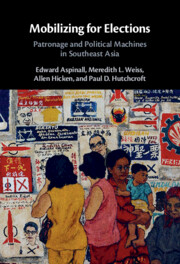Crossref Citations
This Book has been
cited by the following publications. This list is generated based on data provided by Crossref.
Cheng, Edmund W.
and
Lee, Francis L.F.
2023.
Hybrid protest logics and relational dynamics against institutional decay: networked movements in Asia.
Social Movement Studies,
Vol. 22,
Issue. 5-6,
p.
607.
Kasuya, Yuko
and
Miwa, Hirofumi
2023.
Pretending to Support? Duterte's Popularity and Democratic Backsliding in the Philippines.
Journal of East Asian Studies,
p.
1.
Fazekas, Mihály
and
Hellmann, Olli
2023.
Elections and Corruption: Incentives to Steal or Incentives to Invest?.
Studies in Comparative International Development,
Washida, Hidekuni
2023.
Voting behaviour after the collapse of a dominant party regime in Malaysia: ethno-religious backlash or economic grievances?.
The Round Table,
Vol. 112,
Issue. 3,
p.
249.
de Jong, Sara
Berenschot, Ward
Ehrhardt, David
and
Walton, Oliver
2023.
Agents of order? Brokerage and empowerment in development and conflict.
Journal of International Development,
Vol. 35,
Issue. 3,
p.
385.
Yeoh, Tricia
2023.
Incumbency and patronage politics in Malaysia’s GE15.
The Round Table,
Vol. 112,
Issue. 3,
p.
286.
Higashijima, Masaaki
and
Washida, Hidekuni
2024.
Varieties of clientelism across political parties: new measures of patron–client relationships.
European Political Science Review,
Vol. 16,
Issue. 2,
p.
260.
Lim, Merlyna
2024.
Social Media and Politics in Southeast Asia.
Luján, Diego
and
Acosta y Lara, Federico
2024.
Assessing Electoral Personalism in Latin American Presidential Elections.
Journal of Politics in Latin America,
Vol. 16,
Issue. 3,
p.
275.
Dettman, Sebastian
and
Pepinsky, Thomas B.
2024.
Demographic structure and voting behaviour during democratization: evidence from Malaysia’s 2022 election.
Democratization,
Vol. 31,
Issue. 1,
p.
1.
Sari, Lila
2024.
The Limits of Local Power: Business, Political Conflict, and Coastal Reclamation Projects in Makassar, Indonesia.
Journal of Current Southeast Asian Affairs,
Vol. 43,
Issue. 2,
p.
198.
Ordóñez, Martín
2024.
Driven by Clients: A Variant of Clientelism and Its Consequences for Democracy.
Latin American Research Review,
p.
1.



